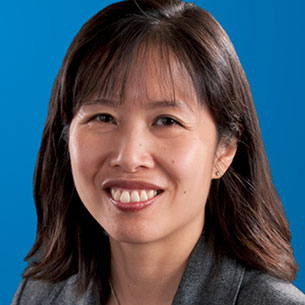I recently had the most emotionally difficult experience of my career thus far. I was on call in the inpatient service while a young mother was dying of advanced cancer. Her entire family, including her young son, was on the floor. We tried to prepare the best setting possible for the young boy by having the Chaplain and social worker with him.
When he realized what was happening, he started to scream. No one, not his father, grandparents, nor the Chaplain could get him to stop. His grandfather asked me if I could speak to him.
Leaving my white coat and my stethoscope at the nurse’s station, I stepped in the room and saw him curled up like a ball with his head in his hands. Two images immediately came to mind. The first was myself as an eight-year-old girl visiting my grandmother in the hospital when she went into cardiac arrest and died. That memory is indelibly burned into my brain. I realized with dread that this young boy would carry whatever I said with him for the rest of his life. I longed to magically find the right words.
The second image was me imagining my own son in the same situation. It was then that I realized that I needed to say what I would want someone to say to my own little boy if I were dying. In a way, this helped to focus me. I told him that I knew there was nothing that I could say to make him feel better. That if I were him, I would be screaming too. That his mother loved him. That his father would always do right by him.
Understandably, I was emotionally drained and miserable afterwards. These kinds of experiences are part of the burden that we bear as oncologists. But as awful as I felt, I have found comfort in the fact that I should feel upset. The moment that I stop feeling emotions like a compassionate human being when faced with my patients’ death and dying is the moment that I should stop being an oncology caregiver. We are enormously privileged to be a part of people’s lives at their most difficult times in a way that almost no other profession allows. Members of the oncology community should continue to support each other through these difficult experiences in order to give the most compassionate care to our patients and families.
When he realized what was happening, he started to scream. No one, not his father, grandparents, nor the Chaplain could get him to stop. His grandfather asked me if I could speak to him.
Leaving my white coat and my stethoscope at the nurse’s station, I stepped in the room and saw him curled up like a ball with his head in his hands. Two images immediately came to mind. The first was myself as an eight-year-old girl visiting my grandmother in the hospital when she went into cardiac arrest and died. That memory is indelibly burned into my brain. I realized with dread that this young boy would carry whatever I said with him for the rest of his life. I longed to magically find the right words.
The second image was me imagining my own son in the same situation. It was then that I realized that I needed to say what I would want someone to say to my own little boy if I were dying. In a way, this helped to focus me. I told him that I knew there was nothing that I could say to make him feel better. That if I were him, I would be screaming too. That his mother loved him. That his father would always do right by him.
Understandably, I was emotionally drained and miserable afterwards. These kinds of experiences are part of the burden that we bear as oncologists. But as awful as I felt, I have found comfort in the fact that I should feel upset. The moment that I stop feeling emotions like a compassionate human being when faced with my patients’ death and dying is the moment that I should stop being an oncology caregiver. We are enormously privileged to be a part of people’s lives at their most difficult times in a way that almost no other profession allows. Members of the oncology community should continue to support each other through these difficult experiences in order to give the most compassionate care to our patients and families.
Disclaimer:
The ideas and opinions expressed on the ASCO Connection Blogs do not necessarily reflect those of ASCO. None of the information posted on ASCOconnection.org is intended as medical, legal, or business advice, or advice about reimbursement for health care services. The mention of any product, service, company, therapy or physician practice on ASCOconnection.org does not constitute an endorsement of any kind by ASCO. ASCO assumes no responsibility for any injury or damage to persons or property arising out of or related to any use of the material contained in, posted on, or linked to this site, or any errors or omissions.


Comments
Don S. Dizon, MD, FACP
Oct, 11 2012 10:13 AM
Beverly: Thanks for sharing your experience. It brings back similar memories, some of which I have written about previously (in a blog with Dr. Merry Markham). It's hardest when patients mirror where you are in your own life. But, sometimes even the most simple gestures make the biggest difference, don't you think? Taking off your white coat and stethescope probably helped this young family view you as a person, in addition to a doctor. Ultimately, I agree with you that part of being a good doctor is allowing yourself to be human and to feel emotions- whether it is laughter, tears, or anguish.
DSD